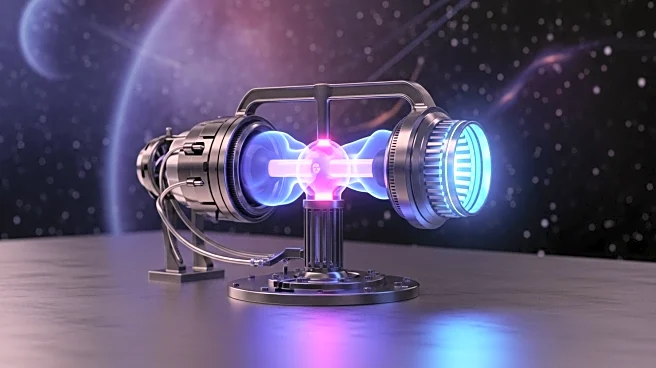What's Happening?
Scientists at Rosatom, Russia's state nuclear corporation, have developed a prototype plasma propulsion engine that could significantly reduce travel time to Mars. The engine utilizes electromagnetically accelerated plasma, specifically ionized hydrogen atoms, to propel spacecraft at speeds up to 100 kilometers per second. This method offers a sustained energy release, converting nuclear-powered electricity into motion, which is more efficient than traditional chemical rockets. The engine's thrust is modest at 6 newtons but is considerably stronger than other ion thrusters, such as NASA's Dawn. The continuous application of this thrust over weeks could enable spacecraft to reach Mars in approximately 30 to 60 days.
Why It's Important?
The development of this plasma propulsion engine represents a significant advancement in space travel technology, potentially revolutionizing interplanetary missions. By reducing travel time to Mars, this technology could accelerate human exploration and colonization efforts, impacting future space missions and international space competition. The efficiency of the plasma engine also suggests a more sustainable approach to space travel, minimizing the need for large quantities of propellant and reducing the environmental impact of space missions. This innovation could position Russia as a leader in space propulsion technology, influencing global space exploration strategies.
What's Next?
Further testing and refinement of the plasma engine prototype are likely necessary before it can be deployed in actual space missions. Collaboration with international space agencies could be a potential next step, as the technology may attract interest from countries aiming to enhance their space exploration capabilities. The successful implementation of this engine in future missions could lead to new partnerships and investments in space technology, as well as increased interest in Mars colonization projects. Monitoring the progress of this technology will be crucial for stakeholders in the aerospace industry.
Beyond the Headlines
The introduction of plasma propulsion technology raises ethical and legal questions regarding space exploration and the potential militarization of space. As countries develop advanced propulsion systems, international regulations may need to be updated to address the implications of faster and more efficient space travel. Additionally, the cultural impact of potentially shorter travel times to Mars could shift public perception of space exploration from a distant dream to a tangible reality, influencing educational and scientific priorities.









